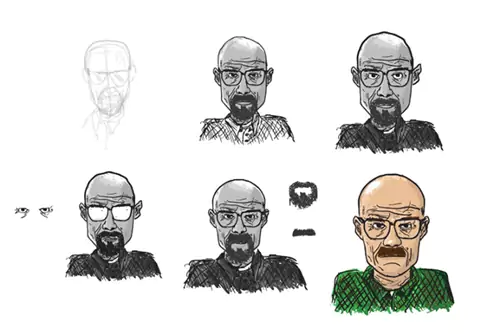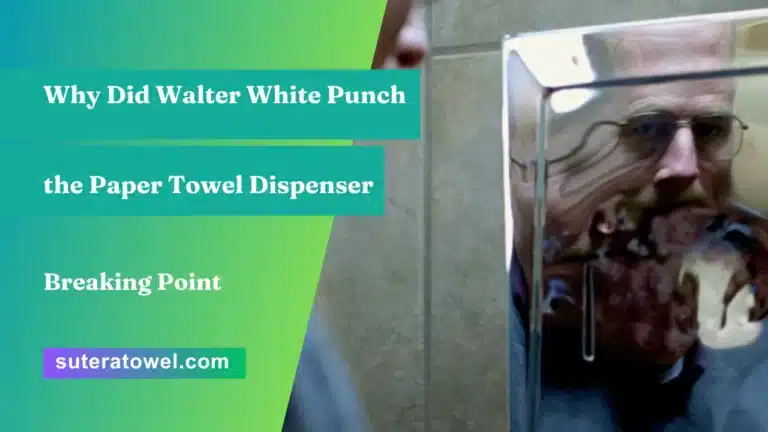Walter White punched the paper towel dispenser out of frustration and anger. In a fit of rage, he lashed out at the dispenser, reflecting his inner turmoil and deteriorating mental state.
The act symbolized Walter’s mounting frustration with his double life as a high school chemistry teacher and a methamphetamine manufacturer. As the central character in the TV series “Breaking Bad,” Walter‘s descent into the criminal world pushed him to his limits, leading to impulsive and destructive actions like punching the paper towel dispenser.
This incident served as a pivotal moment in the character’s development, signifying the depths to which he was willing to sink for his own survival in the dangerous drug trade.
- 1 The Breaking Bad Episode That Shocked Fans
- 2 Understanding Walter White’s Character Development
- 3 Unveiling The Hidden Depths Of Walter’s Rage
- 4 The Evolution Of Walter’s Frustration
- 5 The Paper Towel Dispenser Incident: A Symbol Of Walter’s Anguish
- 6 The Power Dynamics At Play
- 7 Breaking Point: Unmasking Walter’s True Self
- 8 Psychological Analysis: Walter’s Deep-Seated Issues
- 9 Walter’s Symbolic Act: What It Reveals About His Desires And Frustrations
- 10 The Legacy Of Walter’s Rage
- 11 Repercussions On Walter’s Character Arc
- 12 Impact On Walter’s Relationships
- 13 Frequently Asked Questions Of Why Did Walter White Punch The Paper Towel Dispenser
- 14 Conclusion
The Breaking Bad Episode That Shocked Fans

In a shocking episode of Breaking Bad, Walter White’s frustration boils over, leading him to punch a paper towel dispenser. The reasons behind this outburst leave fans questioning his motives and the consequences it may bring.
Walter White’s Outburst And Its Significance
Walter White’s character in Breaking Bad is known for his drastic actions and unpredictable behavior. One particular episode that shocked fans was when he punched the paper towel dispenser. This moment had significant implications for the storyline and Walter’s character development.
Here is why Walter’s outburst holds such importance:
- Walter’s frustration: The built-up tension in Walter’s life as a high school chemistry teacher turned methamphetamine producer finally reached its boiling point. The constant pressure he faced from his risky ventures, personal life, and mounting guilt led him to lash out in this unexpected way.
- Symbolic act: Walter’s punch to the paper towel dispenser symbolizes his pent-up anger and desire to break free from the constraints of his mundane existence. It showcased his growing discontent and thirst for power, setting the stage for the darker path he would ultimately follow.
- Character transformation: Walter’s violent outburst marked a turning point in his character arc. It foreshadowed his descent into a more ruthless and dangerous individual, willing to do whatever it took to secure his place in the criminal underworld.
- Fan reaction: This shocking scene generated intense discussion and intrigue among Breaking Bad fans. Viewers were captivated by the depth of Walter’s character and eagerly awaited the repercussions of his actions in subsequent episodes.
Walter White’s punch to the paper towel dispenser in Breaking Bad was a pivotal moment in the series that left fans shocked and eager for more. It represented the transformation of Walter’s character and signaled a shift towards a darker path.
As the story continued to unfold, viewers couldn’t help but speculate on the consequences of this explosive outburst.
Understanding Walter White’s Character Development

Walter White’s character development offers insight into why he punched the paper towel dispenser, showcasing his growing frustration and inner turmoil throughout the series. This pivotal moment reveals the depths of Walter‘s anger and the unraveling of his mental state.
Walter White’s journey from a chemistry teacher to a drug lord is a compelling tale of transformation and personal growth. Analyzing his character development offers valuable insights into the motivations and conflicts that shaped his actions throughout the iconic TV series, Breaking Bad.
Let’s explore the key aspects of this captivating evolution:
Walter White’s Journey From Chemistry Teacher To Drug Lord:
- Walter White, initially a talented and underappreciated high school chemistry teacher, took a fateful turn when diagnosed with terminal cancer.
- Feeling desperate to secure his family’s financial future, he entered the methamphetamine production business with Jesse Pinkman, his former student.
- His proficiency in chemistry and meticulous planning played a crucial role in the unparalleled quality and purity of the methamphetamine they produced.
- Despite his initial reluctance, Walter gradually embraced his alter ego “Heisenberg,” asserting dominance and exhibiting ruthless cunning in his pursuit of power and wealth.
The Transformation Of Walter’s Personality:
- Walter’s journey from a meek and frustrated chemistry teacher to a feared drug lord exemplifies his gradual shift from being morally principled to morally compromised:
- Walter’s desperation pushes him to embrace the dark side of his personality, unleashing hidden ambitions and shedding societal constraints.
- Over time, his quest for power and control erodes his empathy, and he becomes increasingly willing to manipulate and harm others to protect his interests.
- The immense pressure and constant threat in the drug trade force Walter to make morally questionable decisions, blurring the line between right and wrong.
The Internal Conflicts Driving Walter’s Actions:
- Walter’s transformation is driven by a complex interplay of internal conflicts, providing deeper insight into his character:
- The dichotomy between Walter’s family-oriented facade and his growing attraction to the allure of power exposes the clash between his desire for security and his thirst for significance.
- Ambition conflicting with Walter’s deeply ingrained principles amplifies his internal struggle, as he battles ethical dilemmas while pursuing his criminal endeavors.
- Fear of obscurity and professional mediocrity pushes Walter to embark on a dangerous path, where his intelligence and superior chemistry knowledge become both his greatest asset and his most dangerous weapon.
The Consequences Of Walter’s Character Development:
- Walter’s journey from chemistry teacher to drug lord eventually consumes him, leading to a series of far-reaching ramifications:
- Relationships crumble as his family becomes collateral damage, with his wife Skyler and son Walter Jr. Painfully entangled in the web of his criminal activities.
- The once brilliant but morally conflicted Walter White becomes more ruthless and detached, causing irreparable harm to those around him.
- The erosion of Walter’s identity and moral compass ultimately plunges him into a downward spiral, where the line between good and evil blurs beyond recognition.
Understanding Walter White’s character development provides a captivating study of human nature and the intricate ways in which external circumstances can mold an individual. Breaking Bad offers us a cautionary tale, reminding us of the profound impact our choices have on ourselves and those we hold dear.
Unveiling The Hidden Depths Of Walter’s Rage

Unveiling the Hidden Depths of Walter’s Rage explores the intriguing question of why Walter White, the iconic protagonist of Breaking Bad, punched a paper towel dispenser. Examine the underlying motivations and psychological complexities behind this explosive outburst.
Walter White, the iconic protagonist of the hit TV series Breaking Bad, is known for his transformation from a mild-mannered chemistry teacher to a ruthless drug lord. While his actions throughout the show often left viewers shocked and intrigued, one pivotal moment stands out – the scene where Walter angrily punches a paper towel dispenser.
This display of rage unveils a glimpse into the hidden depths of Walter’s anger. By exploring the factors contributing to his rage and understanding the impact of his struggles on his mental state, we can gain a deeper understanding of his character.
Exploring The Factors Contributing To Walter’s Anger
- Underlying resentment: Throughout the series, we witness Walter’s deep-rooted resentment simmering beneath the surface. His unfulfilled dreams of becoming a successful chemist and the compromises he made in life contribute to his mounting frustration.
- Financial struggles: Looming financial burdens place significant strain on Walter’s psyche. With mounting medical bills and a sense of desperation, he becomes overwhelmed by the weight of his responsibilities.
- Erosion of masculinity: As circumstances force him into the dangerous world of drug production, Walter’s sense of self and masculinity crumble. This loss of identity fuels his anger and leads to impulsive displays of violence.
- Betrayal and broken trust: Walter’s trust is repeatedly shattered as he navigates the treacherous drug trade. The constant backstabbing and deceit intensify his anger, leaving him emotionally raw and prone to explosive outbursts.
The Impact Of Personal Struggles On Walter’s Mental State
- Psychological pressure: Walter’s constant need to keep his criminal activities hidden from his family and close friends takes a toll on his mental well-being. The fear of exposure and the burden of maintaining a double life weigh heavily on his psyche.
- Emotional isolation: As Walter delves deeper into the criminal underworld, he becomes increasingly alienated from those around him. This isolation intensifies his anger, leaving him with limited outlets for emotional release.
- Suppressed emotions: Walter’s anger acts as a cathartic release valve for the accumulation of repressed emotions he has long suppressed. The frustrations and disappointments of his life find an outlet in these explosive displays.
- Fractured sense of morality: As Walter becomes entangled in a life of crime, his moral compass begins to blur. The internal conflict between his actions and the values he once held dear further fuels his anger, adding to his emotional turmoil.
In understanding the complex layers that contribute to Walter’s rage, we gain a deeper appreciation for the intricacies of his character. Breaking Bad viewers are compelled to grapple with the multifaceted nature of human emotions and the destructive power of unchecked anger.
Walter White’s punch of the paper towel dispenser serves as a stark reminder of the hidden depths within us all, waiting to be unveiled when pushed to the brink.
The Evolution Of Walter’s Frustration

Walter White’s frustration reaches a boiling point, leading him to unleash his anger on a paper towel dispenser. Delving into the depths of his character evolution, this article explores the reasons behind his unexpected outburst.
Throughout the series, Breaking Bad, Walter White experiences a transformation that goes way beyond his initial descent into the world of meth production. As his circumstances deteriorate, so does his mental state, leading to explosions of rage and frustration. Let’s analyze the build-up of frustrations throughout the series and explore the link between Walter’s anger and his changing circumstances.
Analyzing The Build-Up Of Frustrations Throughout The Series:
- Constant financial struggles:
- Walter’s initial frustration emerges from his dire financial situation, where his status as a high school chemistry teacher fails to provide for his family’s needs.
- The mounting financial pressure pushes him towards the dangerous path of meth production, adding to his frustrations.
- Underappreciated and overshadowed:
- Walter’s professional life becomes a major source of frustration, as he constantly feels underappreciated and overshadowed by his colleagues and his brother-in-law Hank, a DEA agent.
- The lack of recognition for his brilliance and expertise fuels his growing frustration, leading him to seek validation through the meth business.
- Challenged masculinity:
- Walter’s frustrations also stem from the erosion of his masculinity. He is diagnosed with cancer, constantly reminded of his mortality, and becomes deeply insecure about leaving a legacy for his family.
- The realization that he may leave them with nothing drives him to the edge, intensifying his frustration and triggering impulsive actions.
The Link Between Walter’s Rage And His Deteriorating Circumstances:
- Breaking bad to secure a future:
- As Walter gets further entangled in the criminal world, his frustrations exacerbate, as he becomes desperate to secure his family’s financial future.
- His rage becomes intertwined with his determination to provide for his loved ones, blurring the line between right and wrong.
- The power struggle:
- Throughout the series, Walter finds himself in power struggles with various antagonists, such as Gus Fring and the neo-Nazis. These conflicts further heighten his frustrations and amplify his anger.
- The need to assert dominance and control becomes a driving force behind his violent outbursts.
- Isolation and betrayal:
- Walter’s deteriorating circumstances also lead to his isolation from those closest to him. He faces betrayals from his former partner Jesse Pinkman, his wife Skyler, and even his own ego.
- The feeling of being alone in his journey contributes to the escalation of frustration, fueling his violent acts as he becomes increasingly detached from his old life.
The evolution of Walter White’s frustration in Breaking Bad is a complex and multi-layered process. Walter’s frustrations build up throughout the series due to financial pressures, feelings of underappreciation, challenged masculinity, and a desperate attempt to secure his family’s future.
These frustrations, combined with his deteriorating circumstances, including power struggles, isolation, and betrayal, drive him to punch the paper towel dispenser in a cathartic release of his pent-up rage.
The Paper Towel Dispenser Incident: A Symbol Of Walter’s Anguish

Walter White’s act of punching a paper towel dispenser in “The Paper Towel Dispenser Incident: A Symbol of Walter’s Anguish” reveals his inner turmoil and frustration, offering a glimpse into the deeper reasons behind his actions.
Walter White is a complex character whose actions often speak louder than words. Throughout the acclaimed television series Breaking Bad, numerous instances provide insight into Walter’s state of mind. One such scene that stands out is when he punches the paper towel dispenser in frustration.
This seemingly insignificant act holds a deeper meaning and serves as a symbol of Walter’s inner turmoil. Let’s delve into the specific incident that led to his outburst and uncover the underlying emotions behind this action.
Examining The Specific Incident That Led To Walter’s Outburst:
- Walter’s encounter with the paper towel dispenser occurred at his workplace, the car wash, during a particularly difficult day.
- The dispenser malfunctioned, refusing to dispense the towels when they were needed most.
- Despite Walter’s attempts to fix it, the contraption remained stubbornly nonfunctional, exacerbating his mounting frustration.
This incident may appear trivial on the surface, but it catalyzes Walter’s pent-up anguish, giving us a glimpse into his troubled mind.
Uncovering The Underlying Emotions Behind The Act:
- Frustration and Powerlessness: The dysfunctional paper towel dispenser represents the multitude of challenges Walter faces. It serves as a metaphor for the obstacles in his life that he cannot control or overcome.
- Suppressed Anger and Resentment: Walter’s frustration with his deteriorating circumstances finds an outlet in the form of violence towards the dispenser. This act signifies the anger and resentment that brew within him, seeking release.
- Symbol of Walter’s Fractured Identity: As Walter transitions from being a mild-mannered chemistry teacher to a ruthless drug lord, the paper towel dispenser incident reflects the shattering of his previous self. It represents the clash between his former life and the darkness he now embraces.
The paper towel dispenser incident in Breaking Bad transcends a mere moment of frustration. It provides valuable insight into Walter White’s state of mind, his mounting anguish, and the internal battles he constantly wages. This symbol of his inner turmoil further enhances the complexity of his character, leaving viewers with a lasting impression of the depth and darkness within Walter’s soul.
The Power Dynamics At Play

Walter White’s surprising act of punching the paper towel dispenser in “The Power Dynamics at Play” raises questions about the underlying motives driving his actions. Delving deeper into the character’s psyche uncovers the complex dynamics and underlying tensions that led to this unexpected outburst.
Walter White’s punch to the paper towel dispenser may seem like a sudden burst of anger, but it is crucial to delve deeper into the underlying power dynamics that influenced his reaction. Understanding the complex web of power struggles, both in Walter’s personal and professional life, can shed light on why he resorted to such an act of aggression.
Understanding How Power Dynamics Influenced Walter’s Reaction
- Walter’s struggle for control: Throughout the series, Walter is constantly grappling for control over his life. This desire for dominance stems from his initial feelings of powerlessness and insignificance in his mundane existence.
- Feeling emasculated in his personal life: Walter’s struggle for control extends to his relationships, particularly with his wife, Skyler. As he faces challenges at home, he often resorts to assertive, even aggressive actions to reclaim a sense of power.
- An undermining professional environment: In his professional life, Walter finds himself working under oppressive conditions. The power dynamics within the drug trade industry frequently result in Walter being marginalized and disrespected by more dominant figures like Gustavo Fring.
- A breaking point: The paper towel dispenser incident can be seen as a culmination of the pent-up frustration and powerlessness that Walter experiences. At this point, his actions are not just about the paper towel dispenser; they signify his rebellion against the power dynamics that have constrained him for so long.
By recognizing these power dynamics at play, we can gain a deeper understanding of Walter White’s actions and the psychological impact they have on his character. The constant struggle for control and the overwhelming sense of powerlessness push Walter to his breaking point, resulting in an eruption of anger and violence.
Breaking Point: Unmasking Walter’s True Self

Discover the hidden motives behind Walter White’s explosive outburst as he punches the paper towel dispenser, revealing his true self in a shocking twist. Unmask the psychological complexities driving this volatile action.
In the hit TV series “Breaking Bad,” Walter White’s transformation from a mild-mannered chemistry teacher to a ruthless drug lord captivated audiences worldwide. One particular moment that stands out is when Walter, overwhelmed with frustration and anger, punches a paper towel dispenser in a public restroom.
This outburst not only symbolizes his internal turmoil but also unveils hidden aspects of his personality that were previously concealed. Let’s delve into the significance of this scene and explore how the paper towel dispenser catalyzes Walter’s self-revelation.
Unveiling The Hidden Aspects Of Walter’s Personality Through The Outburst:
- The breaking point:
- Walter’s punch to the paper towel dispenser represents his breaking point, a culmination of mounting tension and suppressed emotions. It highlights the immense pressure he constantly faces and foreshadows the explosive path he is about to embark on.
- A release of frustration:
- The act of violence towards the dispenser reveals Walter’s pent-up frustration and resentment towards the constraints of his life. The dispenser becomes a representation of the limitations imposed upon him, pushing him to lash out in an attempt to assert his control.
- Walter’s true nature:
- Through this outburst, we witness the repressed aggression and ruthlessness that lie beneath Walter’s façade of a meek chemistry teacher. It hints at the darker sides of his personality that will later manifest in his journey down the criminal path.
- A vehicle for self-discovery:
- The paper towel dispenser becomes a catalyst for self-revelation, enabling Walter to confront and acknowledge his underlying desires and untapped potential. It symbolizes his yearning for a different, more powerful identity that he gradually embraces as the series progresses.
- Significance of the public restroom:
- The public restroom setting intensifies the impact of the outburst, as it represents Walter’s realization that he can no longer hide from himself or others. It signifies the transformational place where he sheds his old identity and embraces the new persona he yearns to become.
Through this seemingly insignificant act of violence, Walter White’s punch to the paper towel dispenser illuminates the complex and multi-layered character he embodies. It serves as a turning point, unlocking a world of hidden aspects and setting the stage for the gripping story that unfolds in “Breaking Bad”.
Psychological Analysis: Walter’s Deep-Seated Issues

Walter’s deep-seated issues led to his outburst, punching the paper towel dispenser. A psychological analysis uncovers the underlying reasons behind his violent reaction.
Delving Into Walter’s Psychological Struggles And Their Impact On His Actions
Walter White, the protagonist in the hit TV series Breaking Bad, fascinated audiences with his transformation from a mild-mannered chemistry teacher to a ruthless drug lord. As viewers followed Walter’s journey, they couldn’t help but wonder what drove him to such extreme behavior.
This psychological analysis aims to shed light on Walter’s deep-seated issues and how they influenced his actions.
Unpacking The Events That Triggered His Intense Anger
Throughout the series, Walter displays moments of intense anger, one of which results in him punching a paper towel dispenser. To understand the events that led to this outburst, we must examine the underlying triggers. Here are the key factors that contributed to Walter’s anger:
- Feeling powerless: Walter often felt trapped and powerless in his life, whether it was in his strained marriage, his unfulfilling job, or his battle with cancer. This sense of powerlessness built up over time, creating a strong emotional baseline that could easily escalate into anger.
- Loss of control: As Walter delved deeper into the world of methamphetamine production, he became increasingly entangled in dangerous situations. This loss of control over his circumstances heightened his anxiety and frustration, making him more prone to explosive anger.
- Self-perceived failure: Walter had always harbored ambitions of success and recognition, which were dashed by his mediocre career as a chemistry teacher. This unfulfilled potential propagated a deep-seated sense of failure within him, intensifying his anger and resentment.
- Suppressed emotions: Walter often suppressed his emotions, burying his true feelings beneath a facade of stoicism. This emotional repression acted as a pressure cooker, with anger being the inevitable release valve.
- Lack of communication: Walter struggled with effective communication, bottling up his concerns and frustrations. This inability to express himself and seek support further fueled his anger, causing it to escalate to destructive levels.
By examining these triggers and understanding the psychological struggles Walter faced, we can gain insight into why he reacted with such intensity, ultimately resorting to physical violence against the paper towel dispenser. Breaking Bad’s portrayal of Walter’s character is a testament to the complex interplay between psychological issues and the choices individuals make when faced with adversity.
Walter’s Symbolic Act: What It Reveals About His Desires And Frustrations

Walter White’s symbolic act of punching the paper towel dispenser reveals his deep-seated frustration and suppressed desires. This aggressive action signifies his inner turmoil and the mounting pressure he feels in his life.
Interpreting The Symbolic Meaning Behind Walter’s Act Of Aggression
Walter White’s infamous punch toward the paper towel dispenser in the TV series Breaking Bad was no ordinary act of frustration. Beneath the surface, this symbolic act reveals a deeper insight into Walter’s desires and frustrations. By analyzing the connection between the paper towel dispenser and Walter’s suppressed desires, we can better understand the motivations behind his aggressive behavior.
The Connection Between The Paper Towel Dispenser And Walter’s Suppressed Desires
- The dispenser represents Walter’s yearning for control:
- Walter, as a high school chemistry teacher turned methamphetamine manufacturer, feels increasingly powerless in his life.
- The paper towel dispenser, a simple object that conforms to his touch, becomes a symbol of a world he can manipulate.
- It reflects his frustration with the mundane:
- The mundane act of dispensing paper towels can reflect the monotony of Walter’s former life, consisting of unfulfilling routines and societal expectations.
- His frustration with this banality manifests itself through the act of aggression towards the dispenser.
- The dispenser represents his suppressed desire for rebellion:
- Walter’s foray into the drug trade is a direct result of his suppressed desires for adventure, excitement, and financial security.
- The act of punching the dispenser is a release of those pent-up desires, a rebellion against the constraints that have held him back for so long.
Walter White’s symbolic act of punching the paper towel dispenser showcases the complex web of his desires and frustrations. Through this seemingly minor act of aggression, we gain insight into his yearning for control, his frustration with the mundane, and his suppressed desire for rebellion.
Breaking Bad fans will forever remember this iconic moment as a visual representation of Walter’s inner turmoil and the catalyst for his transformation into Heisenberg.
The Legacy Of Walter’s Rage

Walter White’s angry outburst at the paper towel dispenser in ‘The Legacy of Walter’s Rage’ is a result of his frustration and mounting pressure. This iconic scene showcases his deteriorating mental state and hints at the underlying complexities of his character.
Walter White’s violent outburst where he punched the paper towel dispenser left a lasting impact on his relationships. Let’s delve into the repercussions of his actions and explore how they affected those around him.
The Lasting Impact Of Walter’s Outburst On His Relationships:
- Strained relationship with Jesse Pinkman: Walter’s violent display shook the foundation of his partnership with Jesse. This incident highlighted the growing tensions between them and signaled a decline in trust and respect.
- Deteriorating bond with his wife: Skyler White, Walter’s wife, witnessed his uncontrollable anger firsthand. This event exacerbated the already strained relationship between them, leading to increased distance and mistrust.
- Diminished authority and respect: Before the punch, Walter held an authoritative presence, especially in his role as a high school chemistry teacher. However, his violent outburst tarnished his reputation and eroded the respect others had for him.
Exploring The Repercussions Of His Actions:
- Emotional turmoil: Walter’s rage left him with a sense of regret and guilt. He realized the negative impact his anger had on those he cared about, forcing him to confront his own actions and emotions.
- Heightened anxiety and fear: The incident made Jesse and others around Walter wary of his volatility. This created an atmosphere of anxiety and fear, as they became unsure of what might trigger his rage in the future.
- Self-reflection and regret: Walter’s outburst served as a wake-up call, prompting him to reflect on his behavior and the consequences it had. He began to question his actions and pondered whether there was a better way to navigate his emotions.
Walter White’s decision to punch the paper towel dispenser had far-reaching consequences, leaving a lasting legacy on his relationships. It strained his partnership with Jesse and further distanced him from his wife. The incident also impacted Walter’s authority and respect, challenging his previously unquestioned presence.
This moment of rage forced Walter to confront his emotions, leading to self-reflection and a sense of regret.
Repercussions On Walter’s Character Arc

Walter White’s character arc was marked by escalating frustration and anger, leading to his violent outburst at the paper towel dispenser. This moment showcased his inner turmoil and hinted at the dangerous path he was heading down.
How The Paper Towel Dispenser Incident Shaped The Trajectory Of Walter’s Character
The paper towel dispenser incident in Breaking Bad, where Walter White punches the dispenser in a fit of rage, serves as a pivotal moment that significantly impacts Walter’s character arc. Let’s explore how this incident influenced the trajectory of Walter’s character and the subsequent choices he made.
The Influence Of Rage On His Subsequent Choices
Walter’s violent outburst at the paper towel dispenser reflects a deep-seated rage that had been building up within him. This rage continues to shape his character, leading to several significant choices throughout the series:
- Transformation into Heisenberg: Walter’s punch symbolizes a shift in his personality, marking the birth of his alter ego, Heisenberg. Fuelled by anger, he embraces a ruthless and dangerous path, leaving behind his previously docile and law-abiding self.
- Escalation of criminal activities: The paper towel dispenser incident triggers a desire for control and power within Walter. Fueled by his uncontainable rage, he becomes increasingly involved in illicit activities, such as cooking and distributing methamphetamine, to regain a sense of dominance and control over his life.
- Alienation from loved ones: Walter’s rage-filled actions not only distance him from society but also isolate him from his loved ones. His rage becomes a driving force that consumes his relationships, leading to strained connections with his wife Skyler, former student Jesse Pinkman, and even his own family.
- Justification of unethical decisions: Walter’s rage clouds his judgment and moral compass, causing him to make ethically questionable decisions. He continually justifies his actions by believing that his rage is justified and necessary for survival in the ruthless world he has entered.
- Destruction of personal integrity: As Walter’s rage consumes him, he becomes willing to compromise his values and integrity. This erosion of integrity leads him further down a destructive path, blurring the lines between right and wrong as he commits more heinous acts to protect himself and maintain his newfound power.
The paper towel dispenser incident in Breaking Bad serves as a turning point in Walter White’s character arc, shaping the trajectory of his choices and actions throughout the series. From this moment onward, Walter’s rage drives him to embrace his alter ego, Heisenberg and leads him down a path of criminality, alienation, and moral decay.
The consequences of this incident have a profound and lasting impact on Walter’s character, solidifying his transformation into a complex and ultimately tragic figure.
Impact On Walter’s Relationships

Walter White’s relationships are deeply impacted, leading him to lash out in frustration by punching a paper towel dispenser. His volatile actions stem from the immense pressure he faces in his transformation from a mild-mannered teacher to a ruthless drug kingpin.
Analyzing The Effect Of The Outburst On Walter’s Personal And Professional Relationships
Walter White’s outburst at the paper towel dispenser was a turning point in his life, with far-reaching consequences for his personal and professional relationships. Let’s dive deeper into the impact this display of uncontrolled anger had on Walter’s connections with those around him:
Personal Relationships:
- Strained relationship with his wife, Skyler: Walter’s violent outburst served as a wake-up call for Skyler, who became increasingly concerned about his unpredictable behavior, leading to a breakdown in their marriage.
- Deteriorating bond with his son, Walter Jr.: The sight of his father resorting to physical aggression left a lasting impression on Walter Jr., causing him to question his father’s character and pushing them further apart.
- Tarnished friendship with Jesse Pinkman: Walter’s violent act had a profound effect on his friendship with Jesse, as it shattered the trust they had built over time. Jesse, disillusioned and disturbed by Walter’s behavior, began to distance himself from their partnership.
Professional Relationships:
- Struggles with his co-workers at the meth lab: Walter’s violent tendencies became more evident in his working environment, creating tension and unease among his fellow lab technicians. This strained relationship affected their productivity and cooperation.
- Fractured association with Gustavo Fring: The incident with the paper towel dispenser raised concerns for Gustavo Fring, Walter’s employer and business partner, regarding his stability and reliability. This incident marked a significant turning point in their professional relationship.
- The impact on Walter’s standing within the drug trade: Walter’s loss of control damaged his reputation within the criminal underworld. This outburst exposed his vulnerability and made others question his ability to handle high-pressure situations.
The strain caused by Walter’s uncontrolled anger had far-reaching consequences, permeating both his personal and professional relationships. His inability to manage his emotions effectively resulted in fractured connections and shattered trust, ultimately altering the course of his life.
Frequently Asked Questions Of Why Did Walter White Punch The Paper Towel Dispenser
Why Is Walt Mad His Cancer Is In Remission?
Walt is mad his cancer is in remission because he wanted it to kill him.
What Caused Walter White’s Cancer?
Walter White’s cancer was caused by his exposure to toxic chemicals during his work as a chemistry teacher.
Could Walt Have Survived Cancer?
No, Walt could not have survived cancer.
Why Did Walt Refuse Treatment?
Walt refused treatment due to his personal decisions and beliefs about his health.
Conclusion
Overall, Walter White’s decision to punch the paper towel dispenser in “Breaking Bad” is a clear example of his pent-up frustration and emotional turmoil. This action represents the culmination of his mounting internal conflicts and desire for control.
From the very beginning of the series, we witness Walter’s transformation from a mild-mannered chemistry teacher into a ruthless drug lord. This journey takes a toll on his mental state, leaving him constantly on edge and seeking release. The act of punching the paper towel dispenser serves as a symbol of his unraveling sanity and the immense pressure he experiences as he navigates the dangerous world of methamphetamine manufacturing.
While seemingly irrational, this action can be understood as a manifestation of Walter’s desperation to exert dominance and assert his power. Ultimately, the punch represents the breaking point for Walter’s character, foreshadowing the destructive path that lies ahead.

